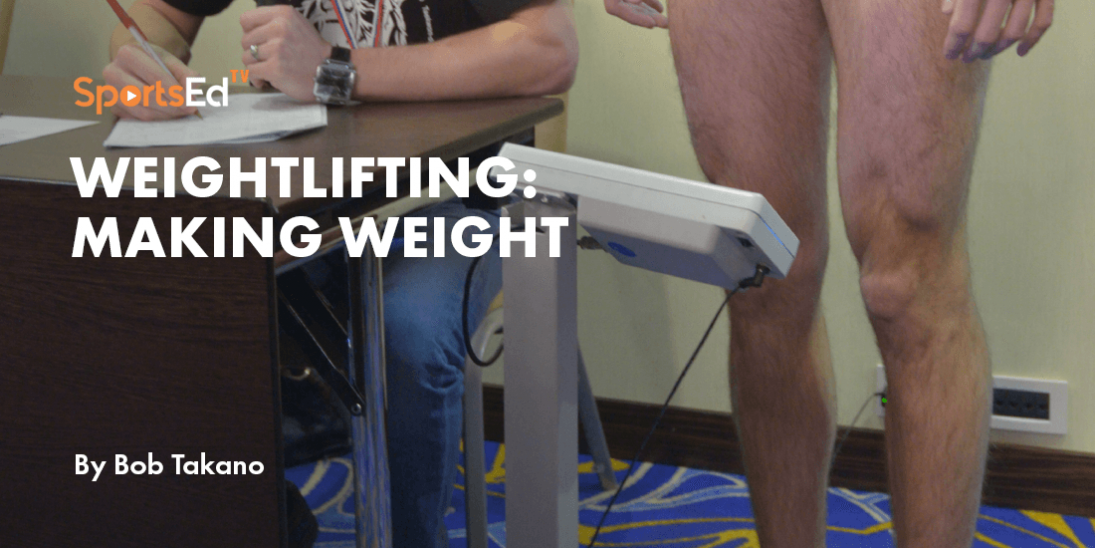Weightlifting
Welcome and thanks for visiting...

Stupid Human Feeding Tricks and More

With credit to David Letterman’s Stupid Human Tricks feature on his former nightly show, Coach Bob Takano (http://www.takanoweightlifting.com) offers food for thought and points out some issues that weightlifters can readily incorporate that are likely to lead to improved performance. Readers may learn more about Coach Takano and Takano Weightlifting by exploring the SportsEdTV Weightlifting Library.
All Too Often
I am regularly amazed by how little importance new weightlifters put on feeding themselves. At Takano Weightlifting the first real training of the day takes place at 12 noon. Some of my athletes, especially during the pandemic, choose to sleep late and not eat enough to get them effectively through the training. Here’s a typical exchange:
Coach: When did you wake up?
Lifter: 10:30
Coach: Did you eat?
Lifter: I had a protein shake
I patiently try to explain that he or she should have awakened at 7:00 AM, had a good-sized breakfast, and then a snack at around 10:30. That would provide enough time to digest and assimilate before the noon session.
There is a reason that breakfast is called breakfast. With a normal schedule, the average person has not eaten for at least eight hours, probably more. This amounts to a fast, or a period without food. Breakfast is when the fast is broken and the digestive metabolism starts to function.
Early Morning Training
There are too many people, both within and without the fitness community, that think athletes train best when they get up early to do so. This is probably due to watching too many of those “up close and personal” segments that appear on Olympic telecasts. These often portray Olympians getting up early and jogging, usually next to railroad tracks. These folks seem to always jog next to railroad tracks and have a parent with a tumor.
Well, early morning training is not necessarily the best time to train, but aerobic athletes in urban areas must do so in order to get the best air quality. This can compromise digestion, however.
The Best Time of Day for Weightlifting Training
When USA Weightlifting had a resident program at the US Olympic Training Center in Colorado Springs, we found that the first training session of the day was most effective in mid-morning. We had the athletes awaken at 7 AM or so and engage in general physical preparation activities. This was preferable to imposing a nighttime curfew and bed check.
After that light session, they could then go to the dining hall, have breakfast, and get prepped at Sports Medicine. This was followed with a snack, after which they were ready for the first lifting session with enough calories to carry out the training. After that training, lifters could do some recovery, followed by heading to the dining hall for lunch. Following a brief nap, they could have another snack and were ready for the late afternoon lifting session. By that time, the athletes would have eaten two large meals and two small meals. Lots of calories for the lifting.
After that training, the group went to dinner, and then later in the evening had another snack. This provided enough calories for recovery.
How much to eat
Most lifters need to ingest between 3,000 and 8,000kcal per day depending on bodyweight and training load. This should be consumed in three large and three smaller meals all evenly spaced out throughout the day with enough time to digest before training. This should be done so as to keep their normal bodyweight slightly above the class limit in which the lifter plans to compete. The general recommendation is for 60% of the calories to come from carbohydrates, 35% from protein, and 5% from fats. While this may be excessive for most recreational lifters, it should drive home the concept that athletes need to feed the machine.
Local Meet Schedules
In the old days meet directors with little or no knowledge of sport science started competitions at 12:00 noon. This ensured that competitors had sufficient time to eat and digest before performing. Some might argue that lifters would not eat before weigh-in as they had to make weight, but not all lifters are cutting weight, and truthfully, there is not much need for most local level lifters to do so.
Currently, because meet directors are more driven by the profit motive, meets start earlier and earlier to accommodate larger start lists. Often smaller women start lifting at 7:00 or 8:00am. This requires waking up at 3:00am or earlier to drive to the meet, and weigh-in around 5:00am. This is clearly not placing performance as a priority; also, there’s probably some gender bias taking place. Furthermore, the smaller women are not getting the chance to nourish themselves adequately for a top-level performance.
Finally
I think it’s time for meet directors, coaches, and athletes to start considering the fueling needs of the athletes for both training and competing. We can talk a good fight and say we’re invested in optimal performance, but if we don’t take into consideration the nutrient intake factor, then we are just talking, and not facilitating.





